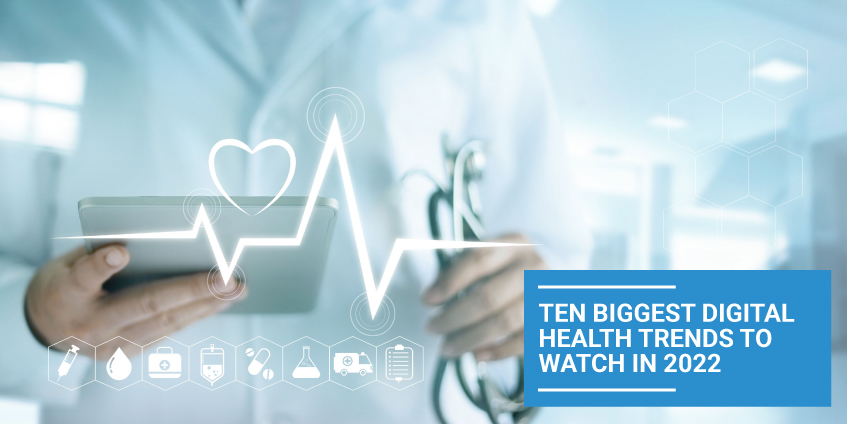
Digital health market size is increasing at a rapid pace and is expected to grow over 17% between the period of 2021 and 2027. This is simply because healthcare organizations tend to jump on the technology bandwagon in this pandemic age.
Advancing technologies have brought many options for the healthcare service providers and make it increasingly confusing for them to decide which technology is worth investing.
In this article, we are going to discuss the top digital health trends you should consider for embracing digital transformation.
The World Health Organization has rightly defined health equity in these words- “The absence of unfair and avoidable or remediable differences in health among population groups defined socially, economically, demographically, or geographically.”
In other words, health equity aims at making healthcare services more accessible and affordable for everyone. Digital health trends promote health equity by improving patient care services.
Here are some interesting facts and figures for digital health before we dig deep into the top ten digital health trends you need to consider for improving healthcare services.
Interesting Facts for Digital Health

The COVID-19 pandemic has played a vital role in expanding the scope of digital health. We will witness its growth in the post-pandemic period as well. As technology evolves, we will see some of the advanced trends that will change the shape of healthcare services forever.
Top Ten Digital Health Trends Set to Dominate Healthcare Sector in 2022
Talking about modern healthcare services, the focus will remain on telemedicine and primary care management approaches.
With this, healthcare service providers also emphasize data security, compliance with prevalent regulations, and easy access to the patient’s information as and when necessary. Our top trends for digital health are also based on these parameters.
Telehealth based on EHR (Electronic Health Record)
Customized telehealth software can make it possible for healthcare service providers to reach a huge audience consists of patients who reside in rural or remote areas. Healthcare experts can easily access the patient’s data at any time and from anywhere thanks to the EHR solution.
Healthcare apps provide an excellent combination of telemedicine and EHR concepts to physicians. As per the study of Fortune Business Insights, the telehealth market is expected to grow by over $185 billion by 2026.
Big Data and AI
Today, AI (Artificial Intelligence) remains present everywhere ranging from household appliances to healthcare devices. But the use of AI in the healthcare sector is full of challenges. Some of the biggest challenges include ethical usage and the patient’s support in using AI-based devices.
Moving forward, we will see exponential growth in the usage of Big Data and AI as healthcare app development companies are striving for addressing these challenges.
Cloud Technology
While addressing privacy-related concerns effectively, the cloud computing concept can assist the healthcare sector to store and access the patient’s data in a better way. It is possible to make informed decisions based on cloud-powered, real-time data related to the patient’s health.
Interestingly, customized mHealth apps can be integrated with the cloud-based environment as well.
Interoperability
The advent of COVID-19 has brought many challenges for all industry sectors, but along with this, it has opened the doors for innovation. One of the important approaches in this pandemic age is interoperability, which is related to the seamless data exchange between different software systems.
The interoperability concept strengthens digital health and will continue to do so in the coming years.
Disease Prediction
While many people are still concerned about how their personal information is being shared and used, AI and ML (Machine Learning) technologies are evolved to assist physicians to predict various conditions including depression, anxiety, and diabetes.
For example, King’s College London has created the Covid Symptom Study app where over 4 million Brits provide an update on how they are feeling on a daily basis.
Health Supply Chain
The logistics and supply chain industry has been hit hard amid lockdowns and social distancing norms. The situation has also created hurdles for hospitals and healthcare organizations in maintaining the health supply chain.
In the coming years, we will see more healthcare service providers will control supply chains with the help of technological advancements.
Patient Experience
Gone are the days when patients blindly listened to the advice of healthcare professionals. These days, many patients are well-informed and want to stay updated with advancements in the healthcare sector.
In such a scenario, it is imperative for healthcare organizations to come up with feature-rich apps that can provide them a personalized and rich experience.
Virtual Consultation
Telemedicine or telehealth is one of the biggest healthcare transformation trends in the year 2021. As millions of billions of people were under lockdown, the best way to access medical services was virtual consulting. Zoom calls and video calls have become new norms as telehealth remains the standard operating procedure.
Amid the roll-out of 5G technology and changing consulting patterns, we can anticipate that this trend will gain ground globally.
Augmented Reality
Digihealth solutions and AR technology combine to enhance telemedicine services. This combination can increase the accuracy of various processes effectively.
As a result, there remains little chance for mistakes. Augmented Reality and Virtual Reality are useful for providing training to medical students and even surgeons and physicians.
Data Security
HIPAA and other regulations ensure the safety of the patient’s private data. Medical service providers need to implement end-to-end data encryption in mHealth apps.
Healthcare app development companies can develop HIPAA-compliant customized apps that can keep the patient’s data secure against any breach attempt.
Concluding Lines
These ten digital health trends show us a glimpse of a new normal in the ever-changing healthcare sector.
All these trends are aimed at bringing digital transformation by promoting innovation. We can certainly expect that these data-driven trends will pay dividends soon across the world as healthcare service providers will integrate advanced mobile apps into their ecosystems.

32










 sales@solutionanalysts.com
sales@solutionanalysts.com biz.solutionanalysts
biz.solutionanalysts






